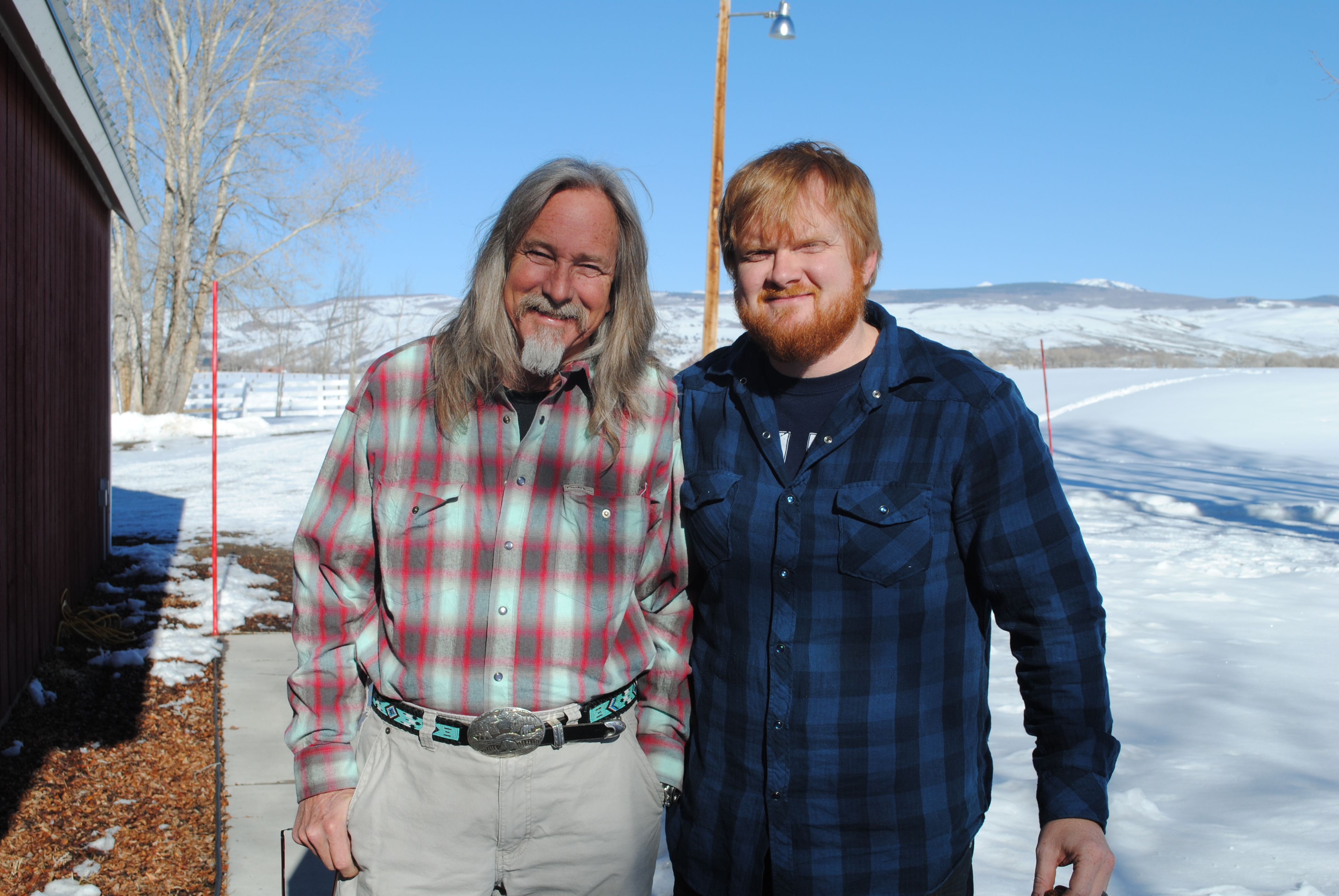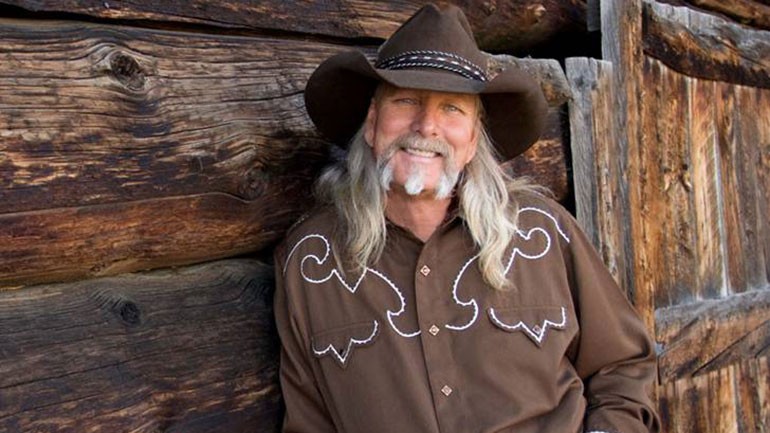At the age of 11, Dean Dillon was inspired by the masses of stars that hang over the Smoky Mountains of his native East Tennessee to write “stars, stars that shine in the sky, how many times have you seen someone cry? Stars, stars, up there all alone, would you keep on shining if your world was gone?”At the age of 11, Dean Dillon was inspired by the masses of stars that hang over the Smoky Mountains of his native East Tennessee to write “stars, stars that shine in the sky, how many times have you seen someone cry? Stars, stars, up there all alone, would you keep on shining if your world was gone?”
Videos by American Songwriter
Today, Dillon says he inspired to write just by getting up in the morning.
“The very fact that I’m alive and breathing and healthy and got a good family, man, is inspiration enough for me to get excited about going and doing some earnest work for songwriting,” says the writer of such hits as “Lying In Love With You,” “By Now,” “Nobody In His Right Mind Would Have Left Her” and “Tennessee Whiskey.” Stopping a minute, he corrects himself. “I say work; it ain’t work. For a while it was but it ain’t no more. When it gets to be work I quit. I don’t ever want to be work, ‘cause work is something you don’t like. You know, if you draw pleasure out of something, you can’t very well call it work, ‘cause it’s fun.”
The 34 year-old found success as a songwriter within the first four years after he moved to Nashville, but success was something he wasn’t accustomed to handling. Already an alcoholic, the royalties from cuts by Hank Williams, JR., Steve Wriner, George Jones, and Barbara Mandrell allowed him to be able to afford more potent drugs which led him on a path near to destruction.
Today Dillon is a strong advocate against taking drugs and drinking and considers himself lucky to be alive.
“I may have written some great songs back during that period of time, but I’m a firm believer that the best stuff is yet to be written as far as I’m concerned,” he asserts. “When I first got sober I was afraid. Here I’d had this crutch all these years that I used; now all that’s turned around. It wasn’t so much that I didn’t think I had the talent but it was the inspiration. I thought I was being inspired. You know I wasn’t getting inspired by anything. But it’s all coming back to me now. When I was in my teens and early 20s even when I was at Pi-Gem Publishing Company I didn’t use any drugs to write songs. I didn’t need any and I don’t need them now.”
Dillon co-writes many of his songs, including such writers as Frank Dycus, Hank Cochran, Royce Porter, Gary Harrison and Warren Robb in his list of writing buddies. He and Dycus often go up to Dycus’ cabin at Dale Hollow Lake, take a long weekend or longer and turn out a couple of hits.
“I’ve been up setting up a lot of writing sessions but that’s hard, to say ‘okay I’m going to write at 10 o’clock, I’m going to be on.’” Dillon admits. “I think the best things come when there ain’t no pressure to do it. Frank Dycus and I just seem to have a gift to be able to do that. I’ll go up there with him to go fishing and on the way up we’ll write a song.”
Dillon first met Dycus in 1973 right after he’d moved to Nashville. “He was at Dolly Parton’s publishing company, him and Larry Kingston. I slept in the basement over there and Dycus would feed me and he’d tell me everything not to do and I’d do it anyway. You can’t tell somebody ‘don’t do that’ you know.”
The two didn’t write together until several years later, when Dillon ran into Dycus again at a restaurant near Music Row. “I had been writing with Shel Silverstein that morning and breakfast turned into lunch with me and Shel and I was still sitting there kicking around when he walked in and I couldn’t believe it was him, I hadn’t seen him in so damn long,” Dillon recalled. “I went over and asked him if he still remembered me and he said ‘Yeah, I still remember you.’ I told him I had a deal with RCA and asked if he’d write a song with me and he said ‘Yeah, I guess so.’ So we sat down and wrote “Unwound.”
The song never made Dillon’s RCA album, but it did get recorded by a new recording artist from Texas, George Strait, and became his first chart single. He followed it with another Dillon/Dycus composition. “Down And Out,” and the songwriter’s relationship with Strait was solidified, as was his writing relationship with Dycus.
“Chemistry, it takes magic,” is Dillon’s answer to what it takes for writers to be good co-writers. “I mean, Frank and I can just sit down in a room and know what each other are thinking. It’s just that type of chemistry is there. Not everybody has that. I can’t write with just anybody. After you’ve been together long enough, you develop that. We were fortunate enough that we didn’t have to be together for five minutes to have it. I write by myself once in a blue moon, but co-writing is a lot more fun. The friendship is there and two heads are better than one.”
The lack of a friend in the form of a father is what Dillon guesses first piqued his interest in songwriting. “It began as an escape in a way, to write down how I felt inside. I missed my father, basically I never knew him because he left before I was born. I’ve never met him, I don’t know who he is or where he’s at. I’ve often thought about him because I’m sure he’s where my music comes from. Nobody on my mother’s side is musically inclined. He played organ and piano so I know that’s where I got my music. That’s awesome to sit down and think about that.”
Dillon’s first paycheck as a writer was $50 a week, but the learning atmosphere at Pi-Gem was worth much more than that. “Hell, I never did learn the business part of it. It wasn’t hard for me to learn the songwriting end because I had such good teachers like John Schweers and Kent Robbins. You know when you have teachers like that teaching you the art of commercial songwriting… working there gave me time to hone my craft. I was there writing everyday, five days a week.”
His relationship at Pi-Gem brought him to the attention of RCA Records, who signed him to a recording deal that just didn’t work out for the young recording artist. He had several chart singles, including “I’m Into The Bottle (To Get Out Of My Mind),” “What Good Is A Heart,” and “Nobody In His Right Mind Would Have Left Her.” The timing wasn’t right somehow, and after a few more releases, he was dropped from the label.
“I wouldn’t have known what to have done, I couldn’t have handled it,” Dillon confesses what might have happened if he’d have hit with a recording career at the time. “I’d been dead now probably. I almost killed myself with the success I had writing. Combine those two and I damn sure would have blown myself up.”
Dillon’s early experiences taught him a few things about publishing in spite of the fact that he says he knows very little about the business of songwriting, and he offers a few words of advice to the new writer.
“First of all, for new writers coming to Nashville, I can’t stress enough the importance to you of the Nashville Songwriter’s Association,” Dillon begins. “I’m not telling you to join them, but I’m telling you to go down there and get some information. There are a lot of legalities involved in publishing songs and you can wind up with the short end. They’ve got deals going around town where they’ll give you a draw against your BMI royalties. They ain’t giving you no draw, they ain’t giving you nothing. Don’t’ ever sign an agreement where they get your BMI or ASCAP check.
“I would advise every songwriter coming into town, if it were possible, to start their own publishing company, then go get a co-publishing deal. God knows that’s not possible, but it’s what I have now with MCA Music. The songs I write are my songs is the way I look at it, but not so when you sign that piece of white paper that says publisher’s agreement. They cease to belong to you any longer. That’s not right. Trust me, it’s in my contract now that I have control over what I write and I have the final say so with my songs.
“Songwriters don’t have a union. We’re the lowest on the totem pole and we create the song. Of all the people who should make money off a song is the guy who wrote it. Another thing I think is terribly wrong with Nashville is the record labels giving the songwriter/artist a ¾ rate on royalties. If I write a song with Joe Blow and $6,000 is made off the song, the record label sends him $3,000 and I get $2,500. Now you tell me that’s right. The reasoning behind that is so they will recoup the investment. Capitol does it with me as a writer/artist.”
Despite his frustrations at seeing what he believes are injustices in the system, Dillon admits that he wouldn’t be doing anything else. “One guy said to me ‘That’s the business you choose to get in, so like it or leave it.’ Oh I have thought of leaving it, we all have at one time or another, but tomorrow is from another day.”
Dillon’s tomorrow looks much brighter than many of his yesterdays. He has a new album coming out on Capitol, filled with his ten songs which he wrote or co-wrote; he’s enjoying watching his daughter grow and teaching her about music; and he’s continuing to have songs cut by some of Nashville’s most popular artists. It’s no wonder his inspiration comes form just getting up in the morning – he has much to look forward to.







![Exclusive: Vince Gill and ERNEST Unveil Opry Magic, Share Songwriting Tips, and Dive Deep into Country Music [Video]](https://savageventures-develop.go-vip.net/wp-content/uploads/2023/10/Vince-Gill-and-ERNEST.jpg)



Leave a Reply
Only members can comment. Become a member. Already a member? Log in.